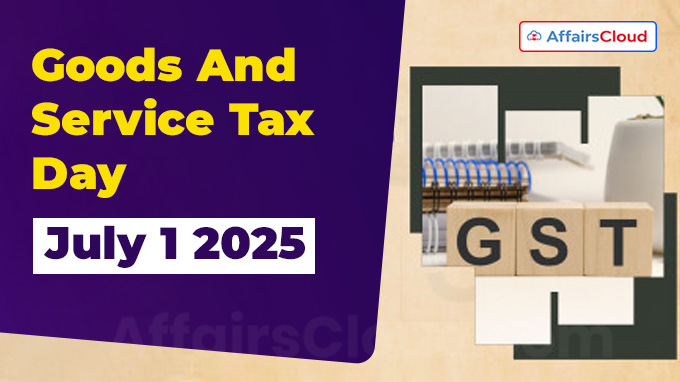 Goods and Services Tax (GST) Day is observed every year on July 1 across India to mark the implementation of the GST regime, a unified indirect tax system on the supply of goods and services, which was introduced on 1 July 2017.
Goods and Services Tax (GST) Day is observed every year on July 1 across India to mark the implementation of the GST regime, a unified indirect tax system on the supply of goods and services, which was introduced on 1 July 2017.
- July 1, 2025 marks the 8th observance of the GST Day.
- The theme for 2025 GST Day is “GST-Simplifying Taxes: Empowering Citizens,” reflecting efforts to streamline tax processes and strengthen compliance.
Background:
i.GST was launched in India on 1 July 2017. On 30 June 2018, the Government of India (GoI) decided to celebrate 1 July every year as ‘GST Day’.
ii.The first GST Day was observed on 1 July 2018 to mark one year of this major tax reform.
About Goods and Services Tax (GST):
i.GST is an indirect tax applied to the supply of goods and services across India.
ii.It is a multi-stage, destination-based tax levied on every value addition, replacing various indirect taxes such as Value-Added Tax (VAT), excise duty, and service tax.
iii.GST established “One Nation, One Tax, One Market,” promoting economic unity across India.
iv.All decisions under GST have been taken through consensus in the 27 meetings of the GST Council.
Genesis and Implementation of GST:
i.In India, the idea of GST was proposed in 2000 when then Prime Minister (PM) Atal Bihari Vajpayee set up a committee.
- A task force led by Vijay L. Kelkar, former advisor to the Ministry of Finance (MoF), suggested that GST would improve and simplify the tax system.
ii.The Constitution (122nd Amendment) Bill, 2014 was introduced in Parliament to enable GST implementation
- It was passed by the Lok Sabha in 2015 and the Rajya Sabha in 2016.
iii.On September 8, 2016, it received Presidential assent, becoming the 101st Constitution Amendment Act, 2016.
iv.The GST Council was constituted on 12 September 2016, along with the establishment of the GST Council Secretariat.
v.GST laws came into force on 1 July 2017, supported by the Goods and Services Tax Network (GSTN) providing Information Technology infrastructure.
Role of the GST Council:
i.The GST Council, constituted under Article 279A of the Constitution, is the apex decision-making body on GST.
ii.Chaired by the Union Finance Minister (Presently Nirmala Sitharaman), the Council includes Union Minister of State for Revenue or Finance, the Finance or Taxation Minister (or any Minister nominated) by each State Government, and a person nominated by the State Governor in case of emergency under Article 356 can be appointed for the role.
iii.As of 30 April 2025, India has more than 1.51 crore active GST-registered taxpayers.
iv.Key decisions of the Council includes,
- Introduction of the e-Way Bill to track the movement of goods. Any registered person must generate an e-Way Bill if goods worth over Rs. 50,000 are transported in a vehicle.
- Mandatory e-Invoicing for businesses with turnover above Rs. 5 crore.
- Reduction in GST on under-construction affordable housing from 8% to 1%.
GST Structure and Tax Slabs:
i.GST operates under a dual model:
- Central GST (CGST): Levied by the Government of India (GoI).
- State GST (SGST): Levied by State Governments.
ii.Integrated GST (IGST): Levied on interstate supplies and imports by the GoI. The collected tax is then shared with the state where the goods or services are delivered.
iii.Current Tax Slabs:
- 0%: Essential items such as milk, eggs, educational services, unpackaged food grains, curd, lassi.
- 5%, 12%, 18%, 28%: Other goods and services categories.
- Electronics such as mobile phones, TVs up to 32 inches, refrigerators, washing machines, geysers, and fans moved to the 18% slab from 31.3% under the old regime.
iv.Special Rates:
- 3% on gold, silver, diamond jewellery.
- 1.5% on cut and polished diamonds.
- 0.25% on rough diamonds.
GST Collections in FY25:
In the Financial Year 2024-25 (FY25), India’s GST collection achieved its highest-ever gross collection of Rs.22.08 lakh crore, recording 9.4% year-on-year (Y-o-Y) growth from Rs. 20.18 lakh crore in FY24.
- The average monthly collection stood at Rs. 1.84 lakh crore.
Deloitte GST@8 Survey:
According to the GST@8 Survey by New Delhi (Delhi) based Deloitte Touche Tohmatsu India LLP, covering 963 respondents across eight industries:
- 85% reported a positive GST experience.
- This is the fourth consecutive year of rising satisfaction, showing increasing confidence in the system.
2025 Events:
On 16 June 2025, the GST Conclave 2025 was organised at Taj Vivanta, Marine Drive, Kochi (Kerala) under the nationwide GST Pakhwada (16–30 June 2025).
- The event was organized by Central Board of Indirect Taxes and Customs (CBIC), Thiruvananthapuram Zone, Kerala.
- It was attended by over 200 stakeholders, featured R. Venkataramani, Attorney General of India(AGI), as Chief Guest and Rajendra Kumar P., Chairman, Indirect Taxes Committee, Institute of Chartered Accountants of India (ICAI), as Guest of Honour and other dignitaries.
i.As part of the celebrations, CBIC Thiruvananthapuram Zone, received a Commendation Certificate for:
- Processing 55% of GST registrations within 7 days (national average: 17%).
- Resolving 83% of GST appeals filed during the year.




